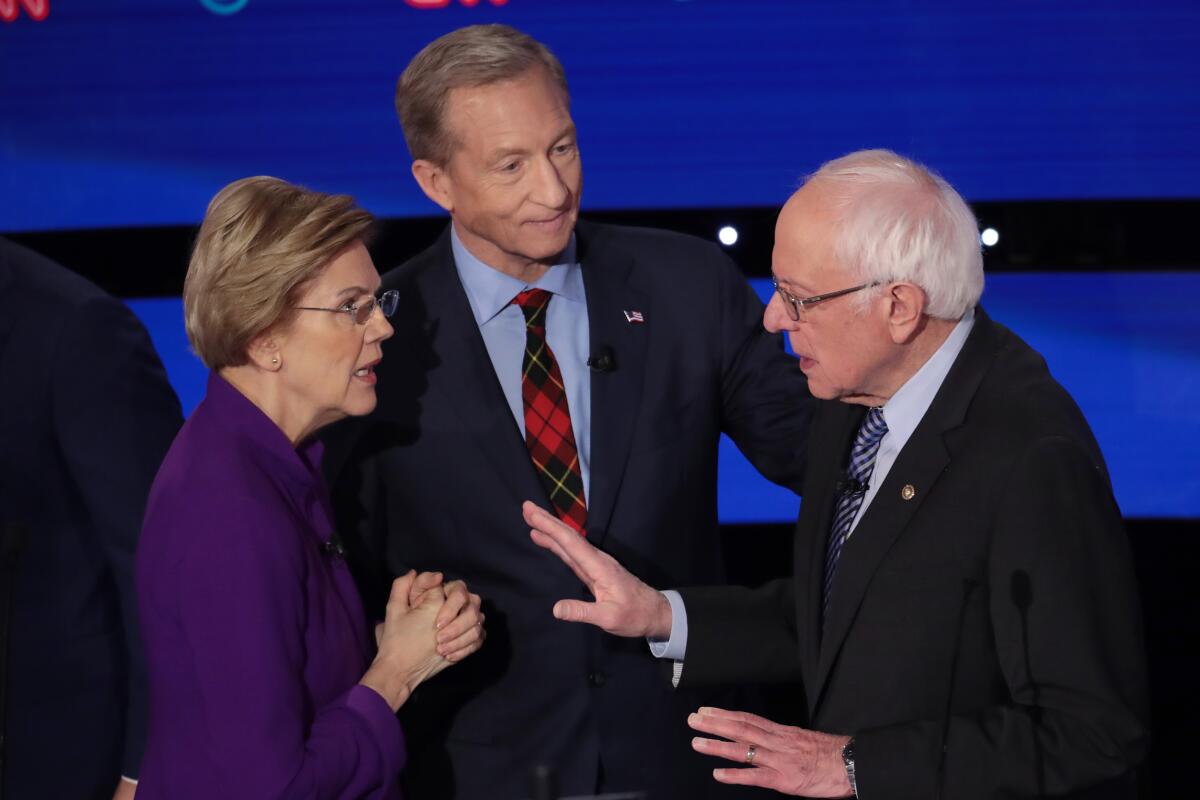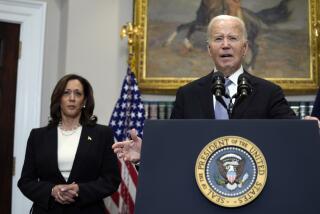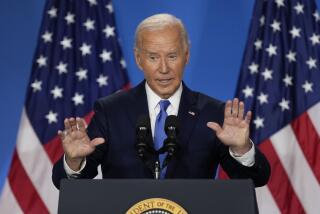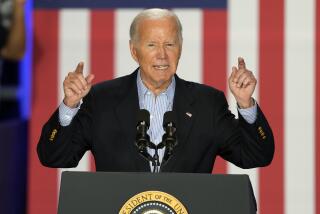Bernie Sanders, in striking distance of an Iowa win, runs into the politics of gender at debate

- Share via
WASHINGTON — Sen. Bernie Sanders, sidelined briefly by a heart attack and consistently underestimated by his rivals, has clawed his way into a position that comes as a surprise to many — within striking distance of winning the Democratic caucuses in Iowa and grabbing crucial early momentum in the 2020 nominating contest.
But his position is fragile enough that as the state’s Feb. 3 caucuses grow closer, Sanders has tried to solidify his standing by intensifying attacks on rivals.
In Tuesday night’s debate, that meant two big moments — a confrontation with former Vice President Joe Biden on foreign policy and trade and a far more fraught encounter with Sen. Elizabeth Warren on the politics of gender.
On both, Sanders attempted to balance the need to draw strong contrasts with rivals and motivate his supporters against the risk of provoking a backlash against negative campaigning in a state where voters are “Iowa nice.”
Democrats in Iowa remember a cautionary tale about the risks of going negative: Sen. John Kerry surged to victory in the Iowa caucuses in 2004 after the front-runners, Howard Dean and Richard A. Gephardt, engaged in bitter negative campaigning — an episode dubbed their political “murder-suicide.”
In recent days, Sanders’ campaign co-chair has claimed Biden’s record on race “betrayed black voters” and Sanders has called some of Warren’s advisors liars.
By contrast, the Vermont senator’s tone on the debate stage was restrained.
“Joe and I have a fundamental disagreement here, in case you haven’t noticed,” Sanders said, referring to Biden as they sparred over trade policy, but he stayed mostly away from attacks that might seem personal.
The exchange with Warren proved more difficult.
When asked directly about the explosive claim that he told the Massachusetts senator in a private meeting in 2018 that he did not believe a woman could win the presidency, he clearly appeared eager to deescalate the hostilities.
“As a matter of fact, I didn’t say it,” Sanders said. “I don’t want to waste a lot of time on this, because this is what Donald Trump and some of the media want.”
Warren was not nearly as ready to let Sanders off the hook, and her response led to the night’s most memorable exchange.
While Sanders had insisted that everyone knows a woman can beat Trump, Warren said persistent sexism is undeniable.
“Bernie is my friend, and I am not here to try to fight with Bernie,” she said. “But, look, this question about whether or not a woman can be president has been raised, and it’s time for us to attack it head-on.
“And I think the best way to talk about who can win is by looking at people’s winning record. So, can a woman beat Donald Trump? Look at the men on this stage. Collectively, they have lost 10 elections. The only people on this stage who have won every single election that they’ve been in are the women. [Minnesota Sen.] Amy [Klobuchar] and me.”
Relations between the two longtime friends and allies in progressive causes do not appear to have been mended: They conspicuously did not shake hands at the end of the debate and appeared to exchange testy words.
Tension between the two was, perhaps, inevitable. Sanders’ hopes of consolidating the support of the party’s left wing ultimately depends on winning over voters who currently back Warren. He has only a limited amount of time to accomplish that goal because Sanders’ path to the nomination turns heavily on a strong showing in Iowa and New Hampshire.
After those two states vote in early February, the competition moves to states where Biden is stronger — Nevada and especially South Carolina.
As he showed in his race four years ago against Hillary Clinton, Sanders is not afraid to draw a sharp contrast. As the debate went on, he directed harsher words to Biden, especially on trade. The former vice president has supported trade agreements with Asian nations, China and the original North American Free Trade Agreement, all of which Sanders opposed.
Those “trade agreements were written for one reason alone. And that is to increase the profits of large multinational corporations,” he told Biden. They “cost us some 4 million jobs, as part of a race to the bottom.”
Biden earlier questioned whether “there’s any trade agreement that the senator would ever think made any sense.”
The two also disagreed on foreign policy, which took on new significance in the wake of the killing of Iranian Gen. Qassem Suleimani, the Iranian retaliatory missile strikes and the downing of a commercial aircraft by Iran.
As he has with increasing urgency on the campaign trail, Sanders appealed to voters’ weariness with foreign entanglements.
“The American people are sick and tired of endless wars which have cost us trillions of dollars,” he said.
He confronted Biden over his vote in 2002 to authorize President George W. Bush to use military force in Iraq in the most personal terms he has used on the debate stage. He referred to briefings the Senate and House received from Vice President Dick Cheney and Secretary of Defense Donald Rumsfeld about Iraq having weapons of mass destruction, which proved to be false.
“Joe and I listened to what Dick Cheney and George Bush and Rumsfeld had to say. I thought they were lying. I didn’t believe them for a moment,” Sanders said. “I took to the floor [of the House]. I did everything I could to prevent that war. Joe saw it differently.”
Calling the Iraq and Vietnam wars “great political disasters,” Sanders said, “Both of those wars were based on lies. Right now, what I fear is that we have a president that is lying again.”
The two also tangled on what may be the biggest difference between them — their opposing views of what it takes to beat Trump.
Biden says winning will take someone with his experience and appeal to a broad ideological spectrum.
Sanders sees that as a retreat to status quo leadership that will lead to the party’s defeat.
“The only way we beat Trump is by a campaign of energy and excitement and a campaign that has, by far, the largest voter turnout in the history of this country,” Sanders said at the debate. “And I believe that our campaign has the strongest grass-roots movement.”
Indeed, that grass-roots energy has put Sanders squarely in the middle of the fight. The Des Moines Register/CNN poll released Friday found him narrowly in first place. That is a remarkable spot for a candidate who was initially discounted by others as a fringe leftist figure, derided as a political retread after his 2016 campaign, criticized as too old for a Democratic Party looking for generational change, and generally disregarded by his rivals as unlikely to win the nomination.
Instead, he has proven to be remarkably resilient. He has been the top fundraiser in every quarter but one. He recovered quickly from his heart attack and won the eagerly sought endorsement of Rep. Alexandria Ocasio-Cortez of New York.
Through it all, his supporters have proved to be immovably committed. The question remains whether he has hit a ceiling or can grow his support. The three weeks between now and the Iowa voting will provide a decisive answer.
More to Read
Get the L.A. Times Politics newsletter
Deeply reported insights into legislation, politics and policy from Sacramento, Washington and beyond. In your inbox three times per week.
You may occasionally receive promotional content from the Los Angeles Times.











